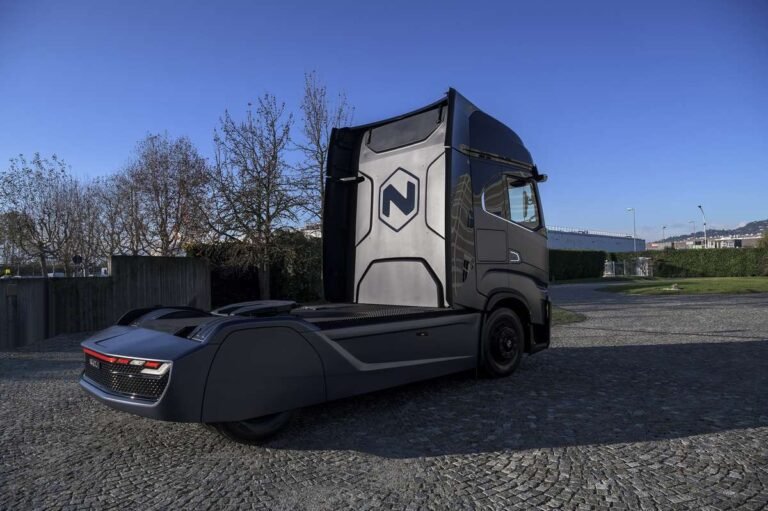The new lineup of electric and hydrogen trucks from IVECO and Arizona-based Nikola Motor Company will be a game changer for truck drivers and operators, said Trevor Milton, CEO and founder of Nikola.
Speaking at the launch of the Nikola TRE, a zero-emission heavy-duty truck targeting the European market powered by Nikola’s proprietary hydrogen fuel cell and battery technology, Milton said Nikola’s technological prowess combined with IVECO’s manufacturing strength was “unstoppable” and would transform the European truck industry.
“Nikola is coming to this market, to Europe, like a freight train,” he added.
“We have created a brand that drivers will be absolutely proud of and will line up to drive. You will see drivers all over the world queuing up to drive these trucks, leaving the companies (that use) diesel engines to drive these trucks.
“Driver turnover will be reduced. But more importantly, the pride of owning this truck will be the greatest achievement for Nikola and Iveco. We will sell it out for many years to come.”
The Nikola TRE, based on the S-WAY truck launched by IVECO in July, is the first fruit of a joint venture agreement between Nikola and IVECO. The agreement, signed in September, saw IVECO’s parent company, CNH Industrial, take a $250 million stake in Nikola.
“Three months ago we completed the paperwork with IVECO, and within three months our teams were able to get this done (launching the Nikola TRE) done without any sleep,” Milton said.
“Most OEMs around the world would take three years to put together a program like this. Our teams were able to take an IVECO S-WAY chassis and completely revamp everything externally and internally to make it completely custom for Nikola.”


“We have been given unrestricted access from IVECO to do whatever we want with this product, which is amazing,” Milton added. “We now have production lines ready to go, built with the same chassis and supplier base.”
The deal with IVECO gives Nikola, which already manufactures the Nikola One and Nikola Two zero-emission trucks for the U.S. market, access to IVECO’s global manufacturing and sales structure, helping it accelerate efforts to disrupt trucking by replacing diesel truck fleets with zero-emission hydrogen fuel cell and battery electric technology.
“We needed a partner,” Milton admitted. “We needed a global manufacturer that had the capacity to help us build these trucks, had assembly lines, had tens of thousands of engineers on the job.
“We didn’t want to repeat that. I couldn’t wait seven years to solve the emissions crisis we are facing now. So we decided to partner with IVECO.”
“Instead of laying off tens of thousands of people, we will hire more. This world is changing – you either support it and create jobs, solve emissions, solve complex social problems, or you hide behind your desk and lay off people,” he added.
“We have chosen to take the high road, the road where we will build the most advanced truck the world has ever seen, and we will build it for Europe. We will build it for the United States.”
The first Nikola TRE units will be delivered to European customers in battery electric vehicle (BEV) format in 2021 with a fuel cell electric (FCEV) model scheduled for 2023.
“This truck will be available in two versions, and we will tell the customer what is really best for them – and we don’t care which way they choose,” Milton said.
IVECO and Nikola expect demand for zero-emission trucks to be supported by EU legislation to reduce carbon emissions. The launch of the Nikola TRE will also help IVECO meet the requirements of new EU rules, which stipulate that manufacturers must reduce CO2 emissions from new trucks on average by 15% from 2025 and by 30% from 2030, compared to 2019 levels.
“We are here to help lawmakers,” Milton said.
“You can enforce zero carbon emissions, it’s ready now, don’t let them lie to you. We’re ready to do it. It’s time to get these vehicles off the road.”
The problem with many new alternative-propulsion trucking solutions is that the fuel and the vehicle often aren’t available at the same time, said Mark Russell, president of Nikola Motors. By contrast, Nikola will take a “chicken-and-egg” approach, starting with hydrogen stations as trucks are sold.
The company’s management believes that fully covering Europe with hydrogen stations would require only about 70 stations, roughly one-tenth of the estimated number needed to adequately cover North America.
With the support of EU lawmakers, hydrogen stations will be deployed on major transport routes from Central Europe to the outside world from 2022, with peripheral countries such as the Iberian Peninsula, the UK and Scandinavia expected to be connected by 2026. Stations in Eastern Europe are then planned to be added from 2030.
More FreightWaves and American Shipper articles by Mike







